Microsoft's next boss: The challenges facing Satya Nadella
- Published
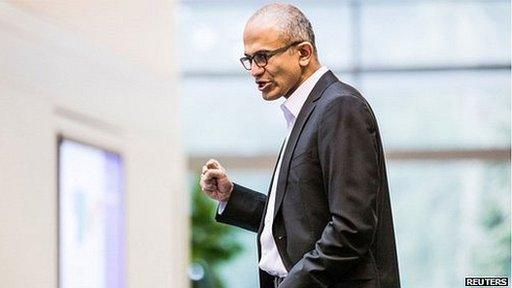
Mr Nadella becomes the third chief executive to run Microsoft
Microsoft has confirmed that Satya Nadella is becoming its new chief executive.
He was formerly in charge of the firm's Cloud and Enterprise division and has never headed up a major company, let alone had to replace the larger-than-life Steve Ballmer to oversee what has become a mishmash of products and services.
So, where to begin with what some have called the "worst job in the world"?
You've just been put in charge of Microsoft, and it's day one.
You sit down, compose yourself, and glance nervously at a to-do list so hefty it should probably be published in volumes. An encyclopaedia of headaches.
When Mr Nadella looks at his new portfolio he'll see something - some may argue - akin to the England football team: ageing stars trying to cling onto their magic, alongside underperforming newcomers yet to reach their full potential.
It's time for a team talk.
Nokia
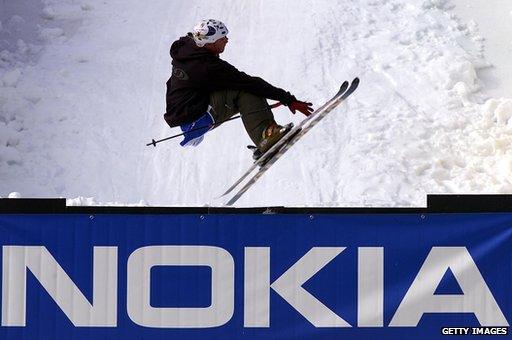
The future of the Nokia brand may be at the forefront of the new chief executive's mind
First up, the firm's star signing of last year, Finnish mobile giant Nokia.
With the Lumia smartphone being the most successful device running the Windows Phone system, Nokia seemed like an ideal addition to the Microsoft family - even if it did cost them a tidy 5.4bn euros ($7.2bn; £4.6bn).
But now what?
"Microsoft has a long history of struggling and being ridiculously slow to integrate acquisitions," says Chris Green, principal technology analyst at the consultancy Davies Murphy Group.
"Nokia is too big and important to stuff up."
One possible strategy may be to utilise and build upon the Lumia brand, which compared to the business-orientated name of Microsoft, might make the devices seem a little racier in the eyes of consumers.
"They have won a lot of credibility back with the Lumia handsets," adds Mr Green.
"The ground work is there."
The one constant, major criticism of Mr Ballmer was that he was too slow off the mark with mobile. Mr Nadella may be in a rush to claw back lost time.
But given Google's sale of Motorola's handset business, there are doubts that simply buying in a major phone manufacturer can work at all.
Windows
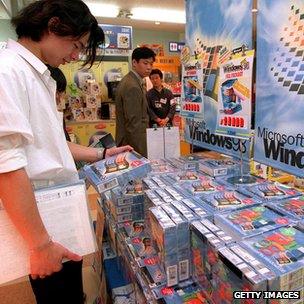
The good old days of Windows 98 are long behind Microsoft
Microsoft pinned a lot of hope on Metro, a new interface for Windows that did away with the tried-and-tested desktop with Start button, and instead offered an attractive set of tiles.
It lent itself nicely to touch-screens, and meant that Windows could look the same whether being viewed on a desktop PC, tablet or smartphone.
But it has not gone quite to plan.
"They still have both a functionality and PR issue with Windows 8," Mr Green says.
"Consumers are still struggling to get on with it. Core business customers are increasingly not upgrading to it."
It's in danger of becoming what is referred to as a "leap-over" product, with companies deciding to stick with Windows 7, and just wait for whatever comes after Windows 8.
Windows 9, you say? Probably - rumour has it that work will begin on it in April, but that is unconfirmed as yet. It may be a chance to get back to basics.
"Windows 8 was unfortunately a bit of a compromise for everyone's demands really," says Nick Odantzis, acting editor of Windows Magazine.
"They alienated a lot of people who like Windows for what it is - a good solid operating system for doing work on, for doing general things."
Xbox
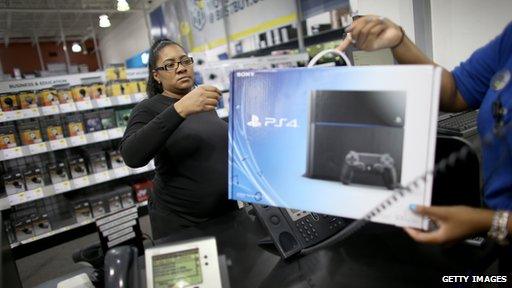
A sight to keep the new boss awake at night - consumers out buying the PlayStation 4
The challenge with the gaming division is not to fix it - but to stop it from breaking.
It's been a good decade. At first, many questioned the logic of Microsoft launching a console at all - but it proved to be a masterstroke, one of the stand-out highlights for the company in recent years.
But with the new console war well underway, the next few years are crucial for the Xbox's long-term success.
Right now, some statistics - released by rival Sony, so read into that what you will - suggest the new Xbox One is being outsold by the PlayStation 4, with games on Sony's console selling more too.
Pre-launch, the Xbox One found itself in a PR quagmire over its pre-owned game policy, while presentations that focused on the Xbox One TV features made hardcore gamers wonder if it was a true "gaming" machine.
But there's a long, long way to go in this battle. Many gaming experts declare the Xbox One to be more ambitious than the PS4, suggesting that Microsoft may have to be patient in the so-far neck-and-neck battle.
The cloud
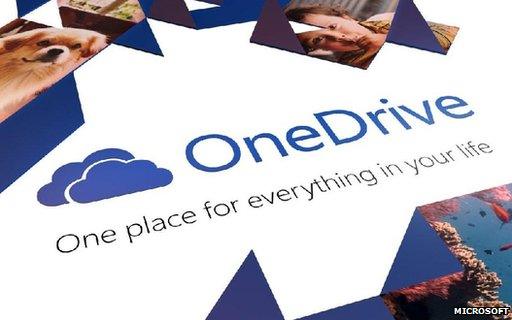
Microsoft wants its OneDrive service to be used by the public to store photos, videos and other files
Satya Nadella has already helped the company's cloud computing operation boost sales.
Cloud computing - which in this context means using software that "lives" on the internet, rather than on your local machine - is a big growth area, and likely to be the way software such as Microsoft Office is used in future.
Indeed, Office 365, which runs in the cloud, has gone down well with businesses, fending off, to some degree, similar offerings from the likes of Google.
Windows Azure, one current cloud-based offer, has begun the transition somewhat, but it is very much a product aimed at businesses.
We may soon seen a version of Windows that is more akin to Google's ChromeOS - a lightweight, and cheap, operating system that has most of its applications running using the web, rather than installed on the machine itself.
The firm is also likely to ramp up efforts to promote its recently rebranded OneDrive cloud storage service as an alternative to Dropbox, Google Drive and Amazon Cloud Drive.
Management and morale
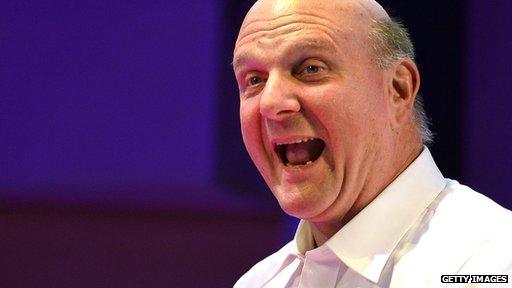
Mr Ballmer was a legendary speaker, but may not have convinced his employees on strategy
One key task for Mr Nadella will be to cheer everyone up a bit.
"I think the new chief executive needs to re-establish Microsoft's identity," offers Catherine Ellis, managing editor of Windows Magazine.
It's true - company morale has taken a bit of a kicking during the Ballmer years.
"Microsoft's employee base never really bought into Ballmer and whatever vision he had for the business," argues analyst Mr Green.
"Like many salespeople, he was seen as a bit too short-sighted."
As well as Mr Ballmer's departure, other high-ranking executives have trickled out of the company in recent years. Among them Don Mattrick, former head of Xbox, who has moved over to social games company Zynga.
Part of the hiring task, then, will be about more than the chief exec - there's a whole backroom staff to consider.
"It's not about hiring one guy at the moment - it's about hiring 20," says Mr Green.
"The management team has been decimated in the past nine months.
"He has to put a whole new generation of lieutenants in place. And he has to have full buy-in from the rank and file."
To get them onside, Mr Green says, Mr Nadella must act quickly.
"He's got to map out a five-year vision for Microsoft in his first 90 days."
Follow Dave Lee on Twitter @DaveLeeBBC, external
- Published4 February 2014
- Published4 February 2014
- Published3 September 2013
- Published23 October 2013
- Published11 October 2013
- Published3 September 2013
- Published26 August 2013